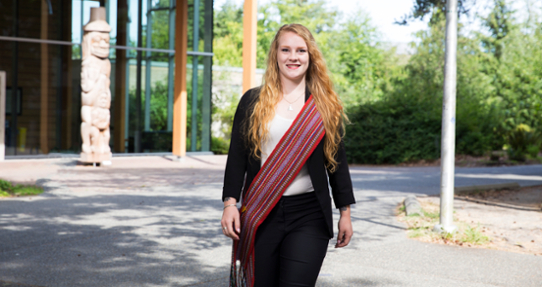Tri-faculty welcomes inaugural Indigenous Resurgence Coordinator, Lydia Toorenburgh
Alf Wilson, Faculty of Science

The Faculties of Science, Social Science and Humanities are grateful and proud to welcome our Indigenous Resurgence Coordinator, Lydia Toorenburgh.
Q. Can you tell us a little about yourself and your path to this position?
I’m Cree-Metis and settler on my mother’s side and first-generation immigrant from Holland on my father’s side. I think that's important because I balance and position myself within three different identities. It really informs my work and my studies. I did my undergraduate degree here at UVic with an honours in anthropology and a minor in Indigenous studies, which was an excellent experience. Directly after that I became the Indigenous recruiter for UVic—a one year appointment—which was deeply rewarding. I didn't reapply for that job so I could start my master's. I took a year to do my master's coursework, also here at UVic. Now I’m in the research phase and started this position in December 2020.
My master’s research is using audio-recording and walking methodologies to learn about how Indigenous people who have lower levels of literacy in English interact with and access services in the health system. I am fascinated by the relationship between audio-visual methods and Indigenous knowledges and research methodologies.
Q. Can you briefly describe the IRC position?
There are three main components.
The first is to help support the administration on how to understand and implement indigenization and decolonization. I spend a lot of time working with the Associate Deans of the three faculties.
The next component is student support. With the pandemic, I haven’t been able to do much of that work yet. I hope that once we're back on campus I can really start engaging with the students, making my presence known, and really getting to know them. So I'll partially be a support staff person for tri-faculty Indigenous students—helping them put on events and refer them to on- and off-campus resources.
The third component is to support faculty and staff again on indigenization and decolonization. I’m putting on events, supporting Indigenous initiatives, and working with the EDI* committees.
*(equity, diversity and inclusion)
Q. How do you hope to see the position unfold?
I would like to create movement and environmental change.
I’d like to see movement within the faculties towards decolonial processes, like limited hiring and training. I’d like to see the integration of Indigenous knowledges into curriculum. I know change can be slow, but I want to see movement toward that goal.
I hope to promote conversations and promote learning that will create a long-lasting environmental change. I want the work that I do to have a resounding impact on the kind of environment that the staff and faculty work in and the students learn in.
—Lydia Toorenburgh, UVic Indigenous Resurgence Coordinator
I also want to put my all into supporting students. Just sending an email to a single person to direct them to the right resources—that will be a success. I want to have as much positive contact with students as possible.
Q. We are currently so limited with our ability to make new connections in a pandemic. Are you finding this to be a challenge?
It's been quite a difficult experience to start a new position not only for myself, but to start a new position for the faculties during a pandemic. And to start that position with the distance has been challenging. Right now I'm building up a foundation and doing other work in preparation for when the job will really pick up and develop as the pandemic begins to ease.
Fortunately this position is for 3 years, which will allow for some continuity and momentum.
Q. There are a lot of departments and schools across the tri-faculty. How are you interacting with all those groups?
Yes, it’s a lot. I’ve been visiting some EDI committees and others are just keeping me in the loop with the their work. Acting as a drop-in consultant is another big part of this position. I’m here to answer questions and to help support the work of other people. It's too much work for one person, so I am in a supportive role to help bring clarity and lend my voice to support initiatives.
Q. Do you have anything specific in mind for the Faculty of Science?
Yes! I’d really like to encourage more relationships and partnerships between faculty members and Indigenous communities. In my degree it was special when the anthropologists—the teachers—already had relationships in a community. Students could file underneath, learn from, and be mentored within a pre-established relationship. I'd really like to see more of that in the sciences. We talk about indigenizing the curriculum and one of the best ways to do that is to have partnerships in community, where the classes and the coursework can support those pre-existing relationships.
Q. A lot of people speak about this as a time of reconciliation. As the Indigenous Resurgence Coordinator, what does ‘resurgence’ mean to you?
I think reconciliation implies that the hurts are over. But there are ongoing hurts.
Resurgence is community-level events and projects. It is about building better relationships with those who are listening. Resurgence is about supporting and returning energies to Indigenous people.
Resurgence is about working with Indigenous partners so they can thrive.
—Toorenburgh
Resurgence is also about creating a space for learning how non-Indigenous can do better and be partners.
Decolonization looks different for everybody and it is specific to your positionality.
There are no easy answers, just big questions.
For more information, please contact Lydia Toorenburgh at: tfirc@uvic.ca
